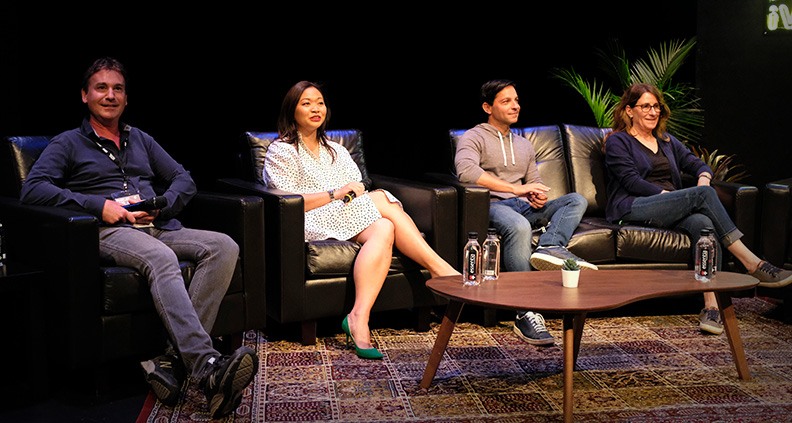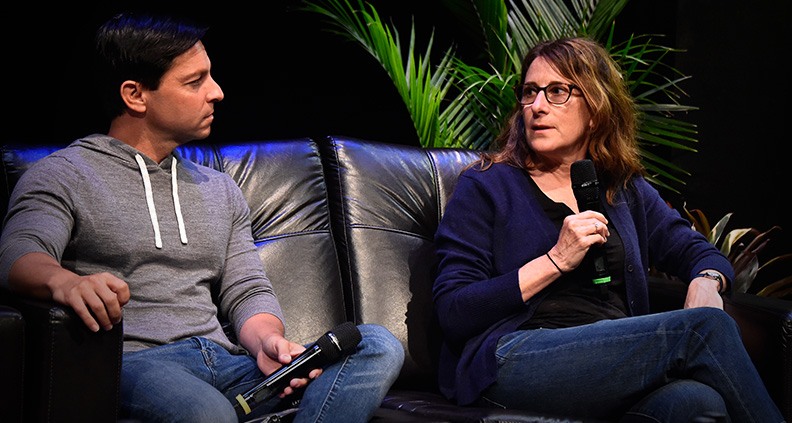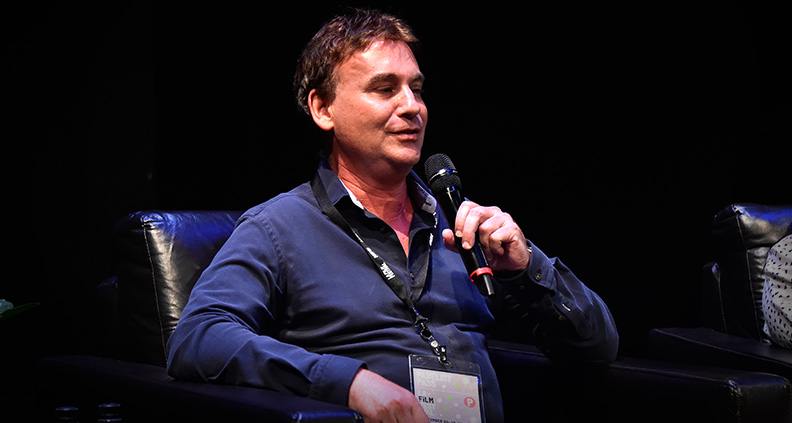Screenwriters Coffee Talk: Love Having Written. Actually Writing? Not So Much.
“It’s not the process of writing. That’s horrible and bloody and terrible. But you send it and then it’s like coming out of prison. The air smells sweeter and everything is more delicious,” so joked screenwriter Adele Lim (Crazy Rich Asians)—her sentiment echoing that of several of her peers on the Screenwriters Coffee Talk panel held Saturday, September 22 at the Wallis Annenberg Center for Performing Arts, part of the 2018 LA Film Festival.
Lim was joined by a diverse group of acclaimed scribes to share their thoughts on a variety of topics, from getting started in the industry, to accountability, to the writers’ process and creative control. The panel was moderated by Film Independent Associate Director of Film Education Paul Cowling and also included Nicole Holofcener (The Land of Steady Habits, Enough Said), Scott Neustadter (The Disaster Artist, 500 Days of Summer) and Steven Rogers (I, Tonya, Kate & Leopold). Here’s what they had to say:
ON BREAKING IN

While the writers on the panel all shared some commonalities, each of their paths to success took quite a different turn.
The Malaysian-born Lim was passionate about writing from an early age but joked that her parents felt it was a bad idea, because “writers are very poor and have no health insurance.” This didn’t stop her from moving to the US, hopping in a car with a boy from her dorm and coming to Los Angeles, where she kick-started her TV career working as a writers’ assistant on Xena: Warrior Princess.
Holofcener, too, always knew she wanted to write. She experienced adversity when her second grade teacher believed she was suffering from a learning disability due to the odd subject matter of a story she had written. Fueled by inspiration from seeing Harold and Maude and reading Judy Bloom, Nicole wrote her first short film, titled It’s Richard I Love.
Neustadter was a self-proclaimed “movie kid” who was so obsessed with writing that he would travel from New Jersey to New York City as a teen and sleep in his aunt and uncle’s utility closet just to be able to intern in the industry. It was Michael H. Weber—his longtime writing partner—who convinced Neustadter to write his first script. “All you do is complain about how terrible they all are,” Neustadter said Weber told him, convincing him to finally write his own screenplay. That script became the Film Independent Spirit Award winning 500 Days of Summer, but according to Neustadter it was never supposed to be read at all, intended instead to exist as a cathartic way for him to exorcise his demons on the page.
Rogers on the other hand did not want to be a writer, first seeking fame as an actor. “I wanted to be in movies. But they didn’t really want me.” So, he said, “I’ll write my own.” Neustadter was quick to point out that this philosophy sure sounded a whole lot like that of Tommy Wiseau—the infamous auteur of The Room as well as the subject of his own Oscar-nominated screenplay for The Disaster Artist.
ACCOUNTABILITY

Another idea touched on was the idea of accountability and staying on track. Neustadter is the only one of the panelists who regularly writes with a partner, which he said was possibly the greatest motivator of all. He said he also prefers to make the coffee shop his office. “I’m always assuming that everyone else around me is writing a better script,” he said, getting a nice laugh from the crowd—many of whom were no doubt visualizing their own Final Draft documents folder.
Adele Lim cut her teeth in the writers’ rooms of various TV shows, which she pointed out is a whole other animal compared, with a far greater degree of collaboration. She spoke to the helpfulness of the built-in parameters that exist as part of preexisting episodic timelines and plot skeletons, which she finds to be helpful in keeping her on track.
Holofcener and Rogers both detailed the battles with procrastination, which they try to combat with routine. Holofcener said she sets a goal of one page per day and forces herself to write at least that, even if it’s terrible. She often struggles to get past page 40, but always finds a way to power through. “If I pay for a hotel room [to work in] then I’ll do like 10 pages a day,” she said.
CREATIVE CONTROL

Once a script is delivered, important challenges still remains. Rewrites are a part of the process for better or for worse, but trying to leverage studio and director feedback to strengthen the script—rather than tarnish it—is key.
Holofcener adds a level of creative control by directing all of her own films. Rogers discussed how demand for a script (in situations where the writer is the one generating the idea) can allow you to be much more selective about your producer and director. He met roughly 40 directors interested in directing I, Tonya and was able to be a little bit picky when it came to choosing the person to see his vision through.
Neustadter believes the more concisely you answer the questions posed to you by the director or studio the more likely they are to understand your vision and keep your script intact. Lim’s experience with the studio was actually quite positive, she said—she was brought in by Warner Brothers to enhance the original Crazy Rich Asians script, by Peter Chiarelli, to ensure cultural integrity. The takeaway? Be as careful as possible when entrusting your script in the hands of others.
While roads to a career in the industry may vary, the ability to just keep writing was a consistent theme in this discussion. As Holofcener succinctly conveyed: “If I fall asleep with a pen in my hand, it counts!”
The 2018 LA Film Festival is taking place September 20-28 at across the city. Catch more of our exclusive coverage on our blog and YouTube channel and be sure to keep up with the Festival on Twitter, Facebook and Instagram. To learn more about how to become a Member of Film Independent, click here.
Presenting Media Sponsor is Los Angeles Times. Official Host Venue is ArcLight Cinemas. Platinum Sponsors are American Airlines, EFILM | Deluxe, HBO and TikTok. The University Sponsor is Loyola Marymount University School of Film and Television. Official Screening Partner is Wallis Annenberg Center for the Performing Arts. Festival Supporters are Directors Guild of America, eTech Rentals, Kona Productions, TREETI and Visit Seattle. Festival Affiliates are 21st Century Fox Global Inclusion, ATK Audiotek, Konsonant Music, SAGindie and Writers Guild of America West. Additional support provided by National Endowment for the Arts. Stella Artois is the Official Beer. IMDbPro is the Official Industry Resource. CITI is the Official Credit Card. The LINE, NoMad Los Angeles and Freehand LA are the Official Hotel Partner. Essentia Water is the Official Water. Hillersden Estate Wines is the Official Wine. Getty Images is the Official Photographer.